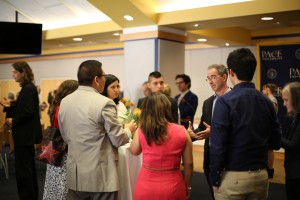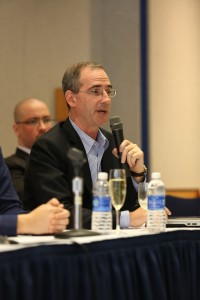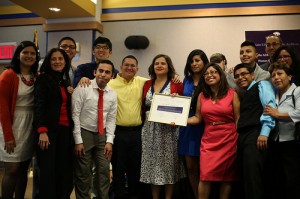HUMAN RIGHTS COLUMN: Imagining immigration reform
As Congress returns from its summer vacation, for the first time in a generation it will confront the meaningful prospect of enacting immigration reform legislation. That reform is even a possibility is due in large part to the courage, militancy, and strategic vision of undocumented immigrant youth across the country, whose risk-taking campaign for legislation to regularize their status has grown rapidly into a broader effort to secure progressive reform for all foreign nationals in the United States, now and in the future. No group has been more important in inspiring one of the great civil rights movements of the first part of this century than United We Dream (UWD), the organization of immigrant youth whom the Abraham Lincoln Brigade Archives has fittingly honored this year.
What should the nation expect this fall? For years, the smart money has bet against immigration reform, even popular measures like the DREAM Act with support in both parties. Given the deep partisan divisions in Congress and the often transparent nativism of a number of Republican legislators, it is entirely likely that the do-nothing House will confirm its reputation as among the worst Congresses ever.

Michael Wishnie and the leadership of United We Dream at the ALBA event in New York, May 2013. Photo Nicholas Chan.
On the other hand, earlier this year the Senate passed a comprehensive bill, with nearly 70 votes. Granted, the Senate bill is deeply flawed. It contains billions to further militarize the southern border, intensifies punitive immigration enforcement programs in the workplace and throughout state and local criminal justice systems, and promises only an extraordinarily-drawn out possibility of legalization for merely some of the more than eleven million undocumented immigrants in the country. The Senate bill also includes a swifter path to citizenship for some immigrant youth and agricultural workers, and a raft of more modest progressive and regressive technical changes to the immigration statutes.
This fall, it may be that the House passes one or more discrete, enforcement-only bills, agrees to a Conference Committee, and something broader emerges – perhaps adding some of the more mean-spirited House provisions to the basic structure of the Senate bill, for instance, or even worse, eliminating the path to citizenship contained in the Senate bill – in other words, condemning millions of people to a permanent second-class status, with work authorization but no possibility ever of enjoying security of residence or formal membership in the national community. The permanent guest-worker approach to immigration policy has been disastrous in Europe, and there is no reason to expect anything more than the entrenchment of a lower caste of primarily Latino and Asian families in this country either.
While the public and many progressive advocates are properly focused on the legislative fight of the moment, it is worth considering several dynamics that will be present regardless of the outcome of the current debate. Some of these circumstances may prove even more important, in fact, then the details of the contemporary fight over legalization, border militarization, future flows of new migration, and so on.
First, whether or not Congress enacts a legalization measure, there will continue to be a population of undocumented immigrants in this country. This inevitable truth is rarely mentioned in the political speeches promising that the nation may at long last “fix” its broken immigration system. This continuing undocumented population will include those excluded from whatever legalization program Congress enacts, if it even does: persons who arrive in the United States after the cut-off date; those who have disqualifying criminal history; those who cannot afford the steep application fees or the obligation to pay back years of taxes; those who cannot meet the Senate bill requirement to stay constantly employed; and those who cannot pass whatever English-language, civics, or other tests are finally imposed. And the future undocumented population will also include persons who arrive for the same reasons that people have migrated for millennia—those fleeing war or seeking refuge from persecution, but who are wrongly denied political asylum, as well as those who cannot access new worker visa programs and instead migrate unlawfully, seeking employment and a better life for themselves and their families.
This future undocumented population may not exceed the current population of eleven million, but it will be subjected to unprecedented, police state-type enforcement by an ever-larger group of immigration agents wielding ever more invasive investigatory and arrest powers. Subjected to such hyper-enforcement, this “super-undocumented” population may come to resemble historic “outlaws,” persons living as secretive and fearful a life as humanly possible, denied the most basic civil and human rights, vulnerable to arrest, mandatory detention, and swift deportation at any moment. Even in the most hopeful scenarios for legislative action this fall, the nation will inevitably confront the reality of a continuing undocumented population.
Second, no matter the resolution of the legislative debate, much vital immigration policy-making will continue to occur at the state and local level. The formal power to regulate immigration is granted by the Constitution exclusively to the federal government, but for decades many of the political decisions most important to the daily lives of foreign nationals have been made sub-federally. It is states, counties, and municipalities that primarily regulate the workplace and fund and organize school systems, hospitals, libraries, police departments, and many other civic institutions with which all U.S. residents interact on a daily basis. Some local jurisdictions will no doubt continue to try to deploy their regulatory powers to exclude undocumented residents and to drive them out of their communities through police profiling and harassment, discriminatory enforcement of housing codes, denial of vital anti-poverty benefits, and similar measures. Other local jurisdictions, by contrast, will pursue more integrative approaches, striving to ensure that all local residents have access to education, health care, libraries, driver’s license, safe workplaces, and so forth, regardless of their formal immigration status. It is certain that the struggle between exclusionary and integrative policies towards new immigrant households will continue in cities and towns across the country no matter the outcome in Congress this fall.
Finally, it is safe to predict that the future of immigration law and policy will depend on the solidarity and sustainability of the collective mobilization currently underway. If the social movement that immigrant youth like those of United We Dream has sparked endures, then regardless of legislation enacted this year, future Congresses will have no choice but to smooth off some of the roughest edges of any 2013 bill. And if that movement fades, then the immigration statutes will remain regressive in operation, and likely only worsen. The veterans of the Abraham Lincoln Brigade recognized that to realize a progressive vision of our future, it is insufficient merely to argue. Sometimes one must fight, even at great personal risk.
The members of UWD understand this lesson. They live it every day. And my money’s on them.
Michael J. Wishnie is the William O. Douglas Clinical Professor of Law, Yale Law School.















